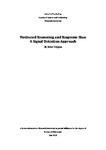Motivated Reasoning and Response Bias: A Signal Detection Approach
| dc.contributor.supervisor | Handley, Simon J | |
| dc.contributor.author | Trippas, Dries | |
| dc.contributor.other | Faculty of Science and Engineering | en_US |
| dc.date.accessioned | 2014-01-02T16:05:14Z | |
| dc.date.available | 2014-01-02T16:05:14Z | |
| dc.date.issued | 2013 | |
| dc.identifier | 10254843 | en_US |
| dc.identifier.uri | http://hdl.handle.net/10026.1/2853 | |
| dc.description.abstract |
The aim of this dissertation was to address a theoretical debate on belief bias. Belief bias is the tendency for people to be influenced by their prior beliefs when engaged in deductive reasoning. Deduction is the act of drawing necessary conclusions from premises which are meant to be assumed as true. Given that the logical validity of an argument is independent of its content, being influenced by your prior beliefs in such content is considered a bias. Traditional theories posit there are two belief bias components. Motivated reasoning is the tendency to reason better for arguments with unbelievable conclusions relative to arguments with believable conclusions. Response bias is the tendency to accept believable arguments and to reject unbelievable arguments. Dube et al. (2010) pointed out critical methodological problems that undermine evidence for traditional theories. Using signal detection theory (SDT), they found evidence for response bias only. We adopted the SDT method to compare the viability of the traditional and the response bias accounts. In Chapter 1 the relevant literature is reviewed. In Chapter 2 four experiments which employed a novel SDT-based forced choice reasoning method are presented, showing evidence compatible with motivated reasoning. In Chapter 3 four experiments which used the receiver operating characteristic (ROC) method are presented. Crucially, cognitive ability turned out to be linked to motivated reasoning. In Chapter 4 three experiments are presented in which we investigated the impact of cognitive ability and analytic cognitive style on belief bias, concluding that cognitive style mediated the effects of cognitive ability on motivated reasoning. In Chapter 5 we discuss our findings in light of a novel individual differences account of belief bias. We conclude that using the appropriate measurement method and taking individual differences into account are two key elements to furthering our understanding of belief bias, human reasoning, and cognitive psychology in general. | en_US |
| dc.description.sponsorship | School of Psychology | en_US |
| dc.language.iso | en | en_US |
| dc.publisher | University of Plymouth | en_US |
| dc.subject | Deductive Reasoning | en_US |
| dc.subject | Belief Bias | en_US |
| dc.subject | Motivated Reasoning | en_US |
| dc.subject | Response Bias | en_US |
| dc.subject | Signal Detection Theory | en_US |
| dc.subject | SDT | en_US |
| dc.subject | Individual Differences | en_US |
| dc.subject | Forced Choice | en_US |
| dc.subject | Cognitive Ability | en_US |
| dc.subject | Analytic Cognitive Style | en_US |
| dc.title | Motivated Reasoning and Response Bias: A Signal Detection Approach | en_US |
| dc.type | Thesis | |
| plymouth.version | Full version | en_US |
| dc.identifier.doi | http://dx.doi.org/10.24382/4784 |
Files in this item
This item appears in the following Collection(s)
-
01 Research Theses Main Collection
Research Theses Main


